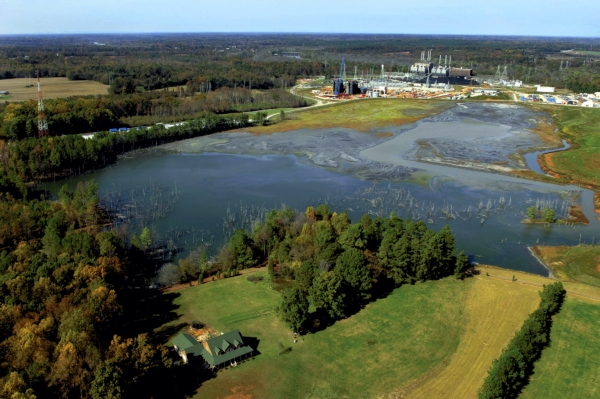State: Buck Steam Station’s coal ash ponds must be excavated
Published 10:38 am Wednesday, May 18, 2016

- A November 2010 aerial photograph of the first holding basin that was being used to hold the coal ash from the coal-fired Buck Steam plant seen in the background. JON C. LAKEY / SALISBURY POST
At least temporarily, Duke Energy will be required to excavate coal ash ponds at Buck Steam Station.
In a news release issued Wednesday, the Department of Environmental Quality ranks most ponds as intermediate priority — including Buck Steam Station. The remaining sites were high priority. None were declared low-priority. As a result, all sites would need to be excavated by 2024, according to state law. However, DEQ said it will ask the state legislature if it can reconsider the classifications in 18 months.
DEQ said dam repair work is planned or underway at coal ash ponds across the state. Deadlines contained in state law are too compressed to allow adequate repairs to be completed, said DEQ secretary Donald R. Van Der Vaart.
Ongoing dam repairs could change the current risks to the environment. Providing nearby residents with permanent, alternative sources of water could also relieve future concerns, the news release stated.
“The focus of the coal ash law was to safely close all coal ash ponds in North Carolina,” van der Vaart said. “The intent was not to set pond closure deadlines based on incomplete information. Making decisions based on incomplete information could lead to the expenditure of billions of dollars when spending millions now would provide equal or better protection. The understanding we have today reflects countless hours of scientific and technical work by both state engineers and Duke Energy as well as thousands of comments by the public.”
At Buck Steam Station, uncompleted repairs include replacing an outlet pipe used to drain water in coal ash ponds and removing any trees that are located on dams. DEQ spokesman Mike Rusher said the trees can negatively affect structural integrity of dams.
Wednesday’s rankings come after a month of public input, when DEQ received more than 900 public comments about Buck Steam Station. The rankings become final in 60 days. If left unchanged, the intermediate priority ranking means Buck Steam Station would need to be excavated by 2024.
Crystal Feldman, a spokesperson for DEQ, clarified Wednesday’s announcement by saying current state law doesn’t necessarily mean classifications will be changed in 18 months. The General Assembly may not grant DEQ the authority to reconsider the rankings.
Environmental groups were upbeat about the rankings, but characterized the possibility of reconsidering rankings as siding with Duke Energy.
“Faced with overwhelming public pressure and clear proof of contamination and other hazards, Governor McCrory and DEQ finally acknowledged today what citizens have known for years that all failing coal ash pits pose a significant risk to communities in North Carolina,” said Southern Environmental Law Center attorney D.J. Gerken. “Duke Energy’s leaking, unlined coal ash pits pollute and pose a significant threat to clean water and communities nearby and downstream across North Carolina … But this administration’s determination to bail out Duke Energy knows no end – and rather than stand up for impacted communities, DEQ now wants the law changed to give Duke Energy a do over in 18 months.”
Gerken and Yadkin Riverkeeper Will Scott classified the possibility of reconsideration as a political maneuver. He said it could result in lowered classifications after November’s election.
“DEQ responded to public pressure today by rating all sites intermediate but left the door open to political pressure from Duke by looking for a ‘do over’ from the legislature eighteen months from now,” Scott said. ‘We know from Duke’s own engineering reports that the Buck site is leaking over 70,000 gallons of water a day into the Yadkin River, much of it contaminated. That’s why we will continue to press our federal Clean Water Act lawsuit to require immediate clean up based on the facts on the ground, not political decisions from Raleigh.”
Duke Energy is opposing DEQ’s proposed rankings too, but it’s for a significantly different reason than environmentalists.
“If NCDEQ’s proposed recommendations are allowed to stand, without review and possible adjustments based on additional new information, the state will have chosen the most extreme closure option that will have a significant impact on customer costs and hinder economic development,” the company said in a prepared statement. “In addition, it will cause decades of disruption to communities, all without additional, measurable environmental benefits. Given the scope of work, there is significant risk in meeting excavation deadlines by 2024.”
When environmental regulators first released rankings for coal ash ponds across North Carolina, Buck Steam Station was also rated “low to intermediate.” It was a classification not contained in state law but used by environmental regulators because Duke hadn’t initially submitted enough information.
The 2014 Coal Ash Management Act would require Duke Energy to submit Buck’s closure plans to DEQ by December 2017, according to Wednesday’s rankings. Similar to priority ratings, closure plans must be approved by state regulators and also require a public hearing and comment period.
Contact reporter Josh Bergeron at 704-797-4246




